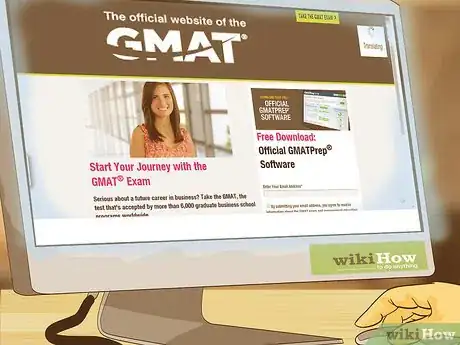This article was co-authored by Stacy Blackman. Stacy Blackman is an Admissions Consultant and the Founder of Stacy Blackman Consulting (SBC), a company that specializes in consulting individuals who want to earn Master of Business Administration (MBA) degrees. SBC offers a video series, runs live and virtual workshops, and has a publishing arm, with 25+ e-guides covering different aspects of the MBA admissions process. Stacy has professional experience working in private equity at Prudential Capital Group, launching Stryke Club, and evaluating businesses as a Resident Entrepreneur at idealab!. She earned a BS in Economics from the Wharton School at the University of Pennsylvania and an MBA from the Kellogg Graduate School of Management at Northwestern University.
There are 17 references cited in this article, which can be found at the bottom of the page.
This article has been viewed 49,346 times.
Research shows that people with an MBA earn significantly more than their non-MBA peers. There are hundreds of business schools that offer part-time MBA programs to working adults. Additionally, many employers offer incentives to their employees who pursue an MBA while working. By communicating well with your employer and learning how to manage your time, you can get closer to accomplishing your goal of earning an MBA while working full time.[1]
Steps
Making the Case
-
1Talk to your employer. Tell your boss about your plans to pursue an MBA. Although the choice is ultimately up to you, your employer will appreciate it if you keep them in the loop about your plans. There may be a big project coming up that will take up a lot of your time. In that case, you should consider waiting to pursue your MBA.[2]
- Frame the topic in terms of the benefit to the company. Consider saying something like, “I want to be become more efficient in my workflow and I think an MBA can make me an even better asset to the company.”[3]
- Try to assuage any fears that going back to school will make you a less effective employee. Tell your boss how you plan to implement what you learn at school into your work at the company.
-
2Ask if getting an MBA will help you get a promotion. Many companies value people with MBAs. Getting an MBA will give you additional knowledge and skills that many employers will reward.[4]
- You can raise the topic by asking about recent job postings you’ve seen within the company. For example, you might approach your boss and say, “I noticed a management position posted and I think I have many of the tools that would make me an effective manager. Would getting an MBA make more competitive for the position?”[5]
Advertisement -
3Find out if your employer offers tuition reimbursement. Some companies put so much value in MBAs that they are willing to reimburse employees for the cost of getting the degree. Most employers who offer this benefit are quite large, but it doesn’t hurt to ask your smaller company too; they may offer smaller grants or other incentives.[6]
- Start by reading the employee handbook. If your company offers tuition reimbursement it will probably be mentioned in the handbook.[7]
- Network with other MBAs in your company. They may have information about tuition reimbursement and how to approach the issue with your boss.
- Approach your boss with a specific plan. Instead of saying, “I’m wondering if you’ll reimburse my MBA tuition,” write out the specific costs involved in getting the degree and present them to your boss. That way, you can say, “The average tuition for the schools I’m interested in is $100,000 and I expect an additional $5,000 for books and other expenses.”
-
4Talk to your friends and family. Pursuing an MBA while working full-time is a big undertaking. You’ll be using most of your free time to study. It’s important to let those close to you know about your decision so they can adjust their own schedules if need be.[8]
- A part-time MBA takes between two-to-three years to complete. Make sure your friends and family understand the commitment involved before you jump into pursuing an MBA.[9]
- If your friends and family are concerned about missing out on time with you, you can consider pursuing your MBA online. This will still be a lot of work, but you won’t have to be away from home as much.[10]
Preparing for an MBA
-
1Research part-time MBA programs. Even if you need to stay in one city for work, there may be many schools that offer part-time MBA programs in your area. An MBA from a prestigious school may give you more opportunities, but you should carefully consider factors such as cost, distance, and time to complete the program.[11]
- Go online to the Association to Advance Collegiate Schools of Business (AACSB). They maintain a list of accredited MBA programs. This list includes schools that offer part-time MBA programs and lists schools that offer part-time online programs.
- Reach out to the schools you’re interested in. Most schools have welcoming admissions departments that provide information sessions and one-on-one tours. Tell them you’re interested in part-time MBA programs and ask whether classes in the part-time program are scheduled in the evenings or on weekends, or both.[12]
- Talk to other students and alumni from the part-time MBA programs you’re interested in. Oftentimes, students and alumni will give you the most unbiased information about the school. This is a good opportunity to ask about how much time students spend in class and studying and what opportunities opened up for alumni after they received their MBA.
-
2Decide if you want to do a traditional program or an online program. Many business schools have both in-person programs and online programs. Research both types of programs and decide which one will work best for you.[13]
- Part-time online MBA programs are usually a bit cheaper and offer more flexibility. You’ll be able to watch recorded lectures from home on your own schedule instead of having to show up to class at a specific time. However, since you’ll rarely be on campus you may miss out on some of the resources the business school has to offer.
- Part-time in-person MBA programs require you to attend classes on a regular schedule. The classes are held in the evenings and/or on weekends to accommodate working students. Since you’ll be on campus often, you’ll have the opportunity to network with your professors and other students. However, taking the traditional path means you’ll have to spend more time away from home.
-
3Seek out financial aid. Fill out the Free Application for Federal Student Aid (FAFSA) and look for other financial aid. The FAFSA is required if you want to get loans from the federal government to cover your tuition. It’s always a good idea to fill it out even if you think you won’t need it. If other funding sources fall through you may end up needing federal loans after all.[14]
- Your employer may be willing to reimburse you for tuition. This should be the first place you look for financial aid.[15]
- Every business school has resources that will help you identify funding sources. Check with each school where you plan to apply.
- Go online to http://www.gograd.org/financial-aid/scholarships/mba/ to find a list of scholarships available for MBA students.
-
4Take the Graduate Management Admission Test (GMAT). The GMAT is required to for admission to most MBA programs. It tests your analytical, writing, quantitative, verbal, and reading skill.[16]
- Consider studying for the test on your own. There are dozens of self-guided GMAT prep programs available. These programs consist of a series of books or online study guides that help you master the topics that will be on the GMAT. If you’re good at studying and learning on your own, this is your best option.
- Consider enrolling in a GMAT course. GMAT courses are taught by business schools professors and other professionals. They give you a more in-depth and intensive prep experience. If you learn better in a classroom atmosphere and cost is not an issue, this is your best option.
- Whichever study option you choose, you should set aside at least one month to study for the exam. If you can only devote a few hours to studying each week, you should spend more than a month studying for the test. Use your evenings and weekends to study for the test. This will be good practice for the study schedule you'll use as a part-time MBA student.[17]
- Register for the GMAT online at www.mba.com and pay the $250 registration fee. The test is offered in hundreds of cities around the world.
- Don’t forget to request the day of the test off from work. Since you’ve already talked to your boss about getting an MBA this shouldn’t be a tough sell.
-
5Apply to schools. Most schools will ask for your GMAT score, college transcripts, work experience, a cover letter or essay, and recommendation letters.
- Most schools charge an application fee. Fees range from $10 to $250 depending on the school.[18]
- If you can, get letters of recommendation from people who are affiliated with the school in some way. For example, if your boss is an alumni you should get a letter of recommendation from them.
Studying While Working
-
1Set realistic expectations. Decide what you want to achieve before you get started in the program. If you’ll be working sixty hours a week while also attending school, it might be a bad idea to aim for being #1 in your class.[19]
- Don’t use your undergrad experience as a barometer. As an undergrad you were likely able to devote your full attention to school. Don’t expect to get the same grades (at least right away) in your MBA program while working full time.
- Pay attention to the competition but don’t let it get to you. Everyone else in your part-time MBA program likely has similar goals: they want to move up in their careers as well. This is a self-selected group of high achievers so you should expect the competition to be tough. Try to remember that you’re there to learn skills and develop a network, not necessarily to be the best in the class.
-
2Budget your time. Pursuing an MBA while working full-time is an ambitious challenge. You’ll need to juggle work, school, and family responsibilities. You should understand how much time you’ll be devoting to each before you jump in.[20]
- Use a planner. Whether digital or paper, a planner is essential to navigating through an MBA while working. Use the planner to write in test days, due dates for both school and work assignments, and other important dates.
- Use a “to do” list with specific tasks. It feels good to scratch things off your “to do” list, and doing so will help keep you on track. If your list says something like “study,” it’s hard to know when you’ve completed the task. Instead, write something like, “study Chapter Two of the Business Skills 101 text and make flash cards.”[21]
- Schedule big study blocks. As a part-time MBA student working full time, you’ll need to use whatever time you have to study. However, you should also schedule study blocks into your planner every week. If you’re a morning person, plan to wake up early and study; if you’re a night owl, schedule your study blocks for nighttime.[22]
- Figure out what you can cut out. You may need to cut back on time at the gym, social activities, or other things in your life.[23]
-
3Schedule downtime. It’s easy to get burned out while pursuing an MBA and working full-time. You should schedule days off ahead of time. That way, you can look forward to your planned days off and not feel guilty when you take them.
-
4Study smart. Studying hard is important for success in your MBA. Studying smart means using the best strategies to study effectively and efficiently.[24]
- Instead of heading to a restaurant for lunch, pack one and study in your office during your lunch hour.
- Keep your study materials with you whenever you can. If you have unexpected downtime, you’ll always be prepared to hit the books.
- Many schools have tutors that can help you with your work. If you’re having trouble understanding a concept you should reach out to a tutor.
-
5Don’t skimp on work. Remember that you’re getting an MBA to improve your marketability. If you start slacking off at work or missing days, the negative impression of your boss could offset any gains from having an MBA.[25]
- If you start to feel overwhelmed, talk to your school first. They have resources to help you manage your time and your stress.
- If worst comes to worst and you feel like you’re going to miss a work deadline, talk to your boss. It’s better to let your employer know beforehand that you’ll be late with a project than to have to explain yourself later.
Using Your MBA Effectively
-
1Use all of your school’s resources. Aside from the degree itself, business schools offer a whole host of resources for budding businesspeople. You should keep up-to-date on events at your school so you don’t miss out on any opportunities.[26]
- Attend professional talks at your school. Most business schools will have stars in the field of business or professors of business come to the school through the year to give talks. Attending these talks is a great way to learn about specific industries and to meet other people who are enthusiastic about an area of business.[27]
- Go to job fairs. Business schools host job fairs several times a year. If you’re looking for a new job this is a great opportunity to meet employers and do interviews. Even if you’re not looking for a new job at the moment, attending a job fair will give you allow you to see what businesses are hiring and network with professionals in your area.
-
2Implement things you learn in your MBA at work. Your coursework will give you new knowledge and skills. Using these skills at your full-time job will be good practice and it will also go a long way towards convincing your employer that you are someone worth keeping around.[28]
- When you encounter a new problem at work, try thinking of it as a case study from your coursework. This will put you in a frame of mind to apply your new knowledge to a real-world situation.
- If your boss puts in you a team, use the teamwork skills you’ve learned through you MBA program to effectively manage the group.
-
3Network! Networking is one of the most important skills for a businessperson. You should use your school’s alumni network to reach out to others in your field.[29]
- Most business schools have a department specifically devoted to helping students build their network. Find out where this department is located and talk to staff there about developing your business network.
- Talk to other MBAs in your company about networking opportunities. Since you’re part of the “MBA crowd” now, there will probably be more opportunities for you to expand your network inside and outside your company.
Expert Q&A
-
QuestionHow can I prepare for MBA while working?
 Stacy BlackmanStacy Blackman is an Admissions Consultant and the Founder of Stacy Blackman Consulting (SBC), a company that specializes in consulting individuals who want to earn Master of Business Administration (MBA) degrees. SBC offers a video series, runs live and virtual workshops, and has a publishing arm, with 25+ e-guides covering different aspects of the MBA admissions process. Stacy has professional experience working in private equity at Prudential Capital Group, launching Stryke Club, and evaluating businesses as a Resident Entrepreneur at idealab!. She earned a BS in Economics from the Wharton School at the University of Pennsylvania and an MBA from the Kellogg Graduate School of Management at Northwestern University.
Stacy BlackmanStacy Blackman is an Admissions Consultant and the Founder of Stacy Blackman Consulting (SBC), a company that specializes in consulting individuals who want to earn Master of Business Administration (MBA) degrees. SBC offers a video series, runs live and virtual workshops, and has a publishing arm, with 25+ e-guides covering different aspects of the MBA admissions process. Stacy has professional experience working in private equity at Prudential Capital Group, launching Stryke Club, and evaluating businesses as a Resident Entrepreneur at idealab!. She earned a BS in Economics from the Wharton School at the University of Pennsylvania and an MBA from the Kellogg Graduate School of Management at Northwestern University.
MBA Admissions Consultant Look for executive MBA programs related to your field of work. Executive MBA programs are designed for working professionals who want to grow in their career, so they're accommodating to people who are currently working.
Look for executive MBA programs related to your field of work. Executive MBA programs are designed for working professionals who want to grow in their career, so they're accommodating to people who are currently working.
References
- ↑ http://www.forbes.com/sites/ronaldyeaple/2012/06/04/does-it-pay-to-earn-a-part-time-mba/#54e56771736f
- ↑ https://mba.csumb.edu/blog/how-to-get-mba-working-full-time
- ↑ http://www.brazen.com/blog/archive/mba-corner/going-back-school-mba-tell-boss/
- ↑ http://www.colorado.edu/business/2016/05/05/how-professionals-earn-mba-while-employed
- ↑ http://www.brazen.com/blog/archive/mba-corner/going-back-school-mba-tell-boss/
- ↑ http://www.forbes.com/sites/ronaldyeaple/2012/06/04/does-it-pay-to-earn-a-part-time-mba/2/#5cf531145f09
- ↑ http://www.kaptest.com/blog/business-school-insider/2016/07/07/mba-tuition-reimbursement/
- ↑ https://mba.csumb.edu/blog/how-to-get-mba-working-full-time
- ↑ http://www.allbusinessschools.com/mba/length-of-mba-program/
- ↑ https://mba.csumb.edu/blog/how-to-get-mba-working-full-time
- ↑ http://www.forbes.com/sites/ronaldyeaple/2012/06/04/does-it-pay-to-earn-a-part-time-mba/3/#58c5dc048118
- ↑ http://www.classycareergirl.com/2012/04/ccg-04-how-to-prepare-for-a-mba-while-working-full-time/
- ↑ https://mba.csumb.edu/blog/how-to-get-mba-working-full-time
- ↑ https://fafsa.ed.gov/
- ↑ http://www.forbes.com/sites/ronaldyeaple/2012/06/04/does-it-pay-to-earn-a-part-time-mba/2/#5cf531145f09
- ↑ http://www.mba.com/us
- ↑ http://www.classycareergirl.com/2012/04/ccg-04-how-to-prepare-for-a-mba-while-working-full-time/
- ↑ http://poetsandquants.com/2013/08/11/are-mba-application-fees-a-ripoff/
- ↑ https://mba.csumb.edu/blog/how-to-get-mba-working-full-time
- ↑ http://www.classycareergirl.com/2012/04/ccg-04-how-to-prepare-for-a-mba-while-working-full-time/
- ↑ http://www.topmba.com/blog/time-management-techniques-top-10
- ↑ http://www.accessmba.com/5-ways-to-handle-work-and-mba/index.html
- ↑ http://www.colorado.edu/business/2016/05/05/how-professionals-earn-mba-while-employed
- ↑ http://www.classycareergirl.com/2012/04/ccg-04-how-to-prepare-for-a-mba-while-working-full-time/
- ↑ http://www.classycareergirl.com/2012/04/ccg-04-how-to-prepare-for-a-mba-while-working-full-time
- ↑ http://www.hrzone.com/engage/managers/in-a-nutshell-five-tips-for-doing-an-mba-while-working-full-time
- ↑ http://www.classycareergirl.com/2012/04/ccg-04-how-to-prepare-for-a-mba-while-working-full-time/
- ↑ http://www.forbes.com/sites/ronaldyeaple/2012/06/04/does-it-pay-to-earn-a-part-time-mba/2/#5cf531145f09
- ↑ http://www.classycareergirl.com/2012/04/ccg-04-how-to-prepare-for-a-mba-while-working-full-time/












































































